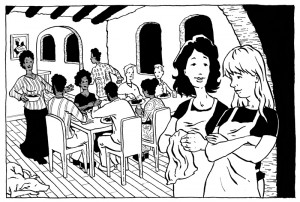 During our four months in Malawi, Africa, our friends from the village have had us for dinner many times and have lavished upon us a kind of hospitality that would put even a Southerner to shame. One friend heard we liked eating outside so he moved all of his living room furniture outside so that we could eat under the stars (next to his chicken huts). Another family had their little ones sing and recite poems for us after we had been stuffed with the most delicious fried chicken I have ever tasted. Each meal starts with a teapot of warmed water being brought round for hand washing. Our hosts and their children are always dressed in Sunday best and we are served the most food and the best parts of the chicken.
During our four months in Malawi, Africa, our friends from the village have had us for dinner many times and have lavished upon us a kind of hospitality that would put even a Southerner to shame. One friend heard we liked eating outside so he moved all of his living room furniture outside so that we could eat under the stars (next to his chicken huts). Another family had their little ones sing and recite poems for us after we had been stuffed with the most delicious fried chicken I have ever tasted. Each meal starts with a teapot of warmed water being brought round for hand washing. Our hosts and their children are always dressed in Sunday best and we are served the most food and the best parts of the chicken.
So in our final weeks here, we realized it was time for us to have our friends for one big party at our house. Emily and I were nervous to cook for Malawians (particularly the women) who had laughed every time we insisted, “Yes, we do cook and we like it!” Most people assume we have someone who cooks for us and when we try to tell them otherwise, our protests are met with uproarious laughter.
So, what do you cook when you know you’re on show? We grappled with the decision. Should we attempt the safer option by cooking familiar Malawian food which they would like? But surely they would measure it against their own cooking. Or should we take the risk of cooking something from our own culture? But maybe they wouldn’t like it. In the end, we decided to cook a roast dinner. Mashed potatoes and gravy, roasted vegetables, steamed green beans and a heap of roast pork.
Emily and I cooked for several hours preparing for our 13 guests – peeling potatoes, chopping vegetables, attending to the pork which cooked for hours outside on the fire. So it was a surprise to us when 20 people arrived. Much like the loaves and the fishes, though, there was more than enough food to fill each of the 20 plates. No one went hungry. Some people enjoyed the roast dinner immensely and compliments abounded, others politely pushed the unfamiliar food around the plate and kept quiet. All the while, the Zambian music so popular in Malawi blared in the background and our friends were, plate in hand, eating, singing and dancing all at the same time. As a cook, it’s a wonderful feeling when the rush of cooking and serving is over and you can stand in the kitchen doorway, looking into a room of your dear friends and see that everyone is simply having fun.
Whether describing the food, the glow sticks we’d handed out, the photos we had shown, the music videos we were playing on our laptop or the pinwheel-style cookies we had passed round for dessert, the phrase of the night seemed to be, “Interesting…very interesting.” And it made me realize: sometimes the food doesn’t really matter. It’s what happens around it. I was glad we had shared some of our culture with them after so many months of soaking up the Malawian customs and tradition around us.
At the end of the night, the women insisted on doing the dishes for us, but our little sponges and dish soap were completely foreign and relatively useless to these women from the village. They sent a young girl outside to fetch a bowl of dirt and sand that they use as an abrasive to scrub pots and pans clean. Now it was truly our turn to say, “Cleaning with dirt? Interesting…very interesting.” But truth be told, our pots have never been so shiny.
Great perspective to keep—remembering that what happens around the food is most important. An attitude I am going to adopt. Thank you and Merry Christmas!
Sounds like a wonderful evening! Not at all like the Africa Allen & Randy, and Steve and I saw. I’m jealous.
Would love to have joined your dinner party, Maggy. Great perspective too — a meal is also about people, connecting and having fun. But what about cleaning with dirt?!
What a lovely story! Merry Christmas!